History of the Horse – Part 22
|
|
Geschichte des Pferdes – Teil 22
|
Christmas Gifts for your Horse!
- For quite a few Blogs now I have had the feeling that I should be more positive about the History of our Horses… it turned out to be difficult, as I came across so many ugly things, which are statistical facts!
One thing has become abundantly clear:
- We may be convinced that we love our horses, but we are USING them – and in most cases we do not even question this kind of relationship. After all – that is what we bought them for, no?
- In human relationships there are similar examples of partnerships, such as “a wife has to obey her husband” (and clean and cook, wash and serve) and: “children are there to be seen, but not heard” (and had to take over father’s business, whether they wanted that or not), which don’t sound too appealing now, but have changed! (Have changed in some countries!! Let’s not forget that this very month, December 2015, the women in Saudi Arabia are allowed to vote for the very first time, but are still not allowed to drive…) So perhaps the way of looking at our relationship with horses can change too!
- The question is not, whether it is right or wrong to use our horses for our purposes – but rather, whether we do so against their will, their instincts and their needs. As long as we use them for our purposes but in harmony with their natural inclinations, such a partnership can be entirely positive. But is it?
|
|
Weihnachtsgeschenke für unser Pferd!
- Seit einigen Blogs habe ich nun schon das Gefühl, daß ich mich positiver über die Geschichte des Pferdes äußern sollte… aber das erwies sich als schwierig, da so viele häßliche Dinge ans Licht kamen, die einfach statistische Tatsachen sind!
Eins wurde überdeutlich:
- Wir mögen überzeugt sein, daß wir unsere Pferde lieben, aber wir NUTZEN sie aus – und in den meisten Fällen hinterfragen wir diese Art der Beziehung nicht einmal. Denn dafür haben wir sie ja gekauft, oder?
- In zwischen-menschlichen Beziehungen gibt es ja auch Ähnliches wie z.B. „Ehefrau muß gehorchen“ (und kochen, putzen, waschen, dienen) und: „Kinder soll man sehen, aber nicht hören“ (und dann müssen sie das Geschäft übernehmen, ob sie wollen oder nicht), was auch nicht so toll klingt – aber es hat sich viel geändert! (In manchen Ländern jedenfalls!! Wir wollen nicht vergessen, daß in diesem Monat, Dezember 2015, die Frauen in Saudi-Arabien zum ersten Mal wählen dürfen – aber immer noch nicht Autofahren…) Also vielleicht kann sich ja auch die Art, wie wir die Beziehung zu unseren Pferden betrachten, ebenfalls ändern!
- Die Frage ist ja nicht, ob es richtig oder falsch ist, daß wir die Pferde für unsere Zwecke benutzen – sondern eher, ob wir es gegen ihren Willen, ihre Instinkte und ihre Bedürfnisse tun. Solange wir sie zwar für unsere Zwecke, aber in Harmonie mit ihren eigenen natürlichen Neigungen nutzen, kann solche Beziehung total positiv sein. Aber ist sie das?
|
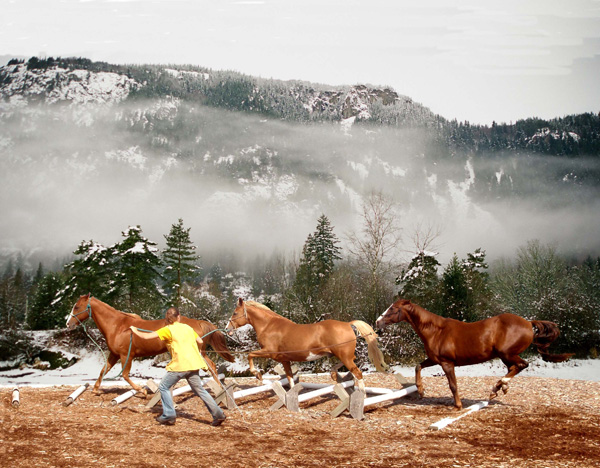 Playing in a group is something that horses LOVE.
In der Gruppe spielen ist bei Pferden sehr beliebt!
|
For that we have to:
- Know what their natural inclinations ARE and understand what they are saying (see my Blog Series “Understanding your Horse”)
- And we have to be honest about our own short-comings (which is the hardest!)
No excuses:
- I don’t mind, if people spend a lot of money… somebody has to keep the economy going! What I DO mind, if this gets in the way of an honest assessment of our actions: if the horse does not perform well under the saddle, it MIGHT be a problem with the saddle… but it is usually a problem with the rider – same goes for bridles and so on. Honestly looking into your own short-comings in regards to your horse takes courage! In those cases, buying a better saddle is not the required favour to your horse…Many riders spend a lot of money “on their horses”. But this is not a favour to their horse – they really they spend it on themselves – there is a great industry out there making money on all sorts of things the horse could not care less about. Equipment for the rider, equipment for the horse – everybody knows how lucrative it is to rob a tack room!
|
|
Dafür müssen wir:
- Erst mal wissen, was ihre natürlichen Bedürfnisse SIND und müssen verstehen, was sie darüber aussagen (siehe Blog Serie „Ihr Pferd verstehen“)
- Und wir müssen über unsere eigenen Unzulänglichkeiten ehrlich sein (das ist das Schwerste!)
Keine Ausreden:
- Mir ist ja egal, ob viele Leute viel Geld ausgeben… jemand muß ja die Wirtschaft am Laufen halten! Was ich aber nicht mag, ist, wenn das die Einschätzung unserer Fähigkeiten trübt: wenn das Pferd unter dem Sattel nicht gut geht, KANN das ja am Sattel liegen… meist jedoch liegt das Problem beim Reiter – dito mit Trensen usw. Man braucht Mut seine eignen Mängel zuzugeben! In solchen Fällen nützt es dem Pferd wenig, einen neuen Sattel zu kaufen…Viele Reiter geben ja viel „Geld für ihre Pferde aus“ – eigentlich aber für sich selbst, denn es sind keine Wohltaten für sie. Wir haben ja gesehen, daß es eine Riesenindustrie gibt, die gut daran verdient – Ausrüstung für Pferd und Reiter zuhauf – und jedermann weiß, wie lukrativ es ist eine Sattelkammer auszurauben!
|
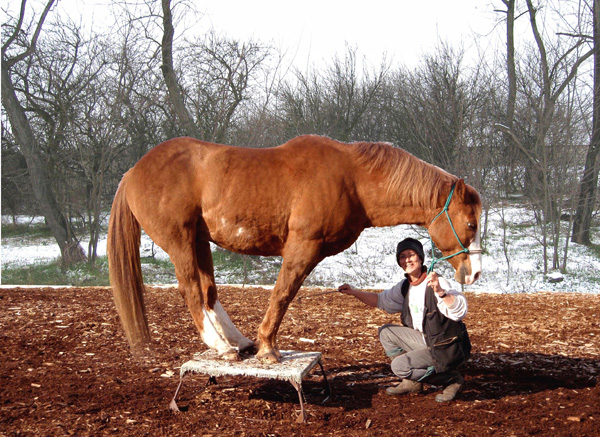 A trusting horse will place his feet exactly as directed by you.
Ein vertrauensvolles Pferd plaziert seine Füße genau nach Anleitung. |
The horse only cares about the relationship!
- Are we giving the horses the loving treatment they deserve or are we just exploiting their gentle and congenial nature, and really trying to rule them?
- When teaching, I am always shocked how deeply ingrained it seems to be in humans to demand obedience – and how rarely horse-owners are able to chuckle about the occasional rascally nature of their “kids”, who after all, also have to test whether they cannot kick over the traces ever once in a while. When I was a child, we were expected to obey – there was very little discussion. And we rebelled occasionally (when we dared). I feel like that again, when I watch folks “training” their horses…
Christmas gift # 1: be friendly !
- Why does it seem so hard for us to be simply friendly to them? If you can just put yourself in their “hooves” and treat them like you wish to be treated yourself, you can’t do wrong. (Of course: if we were able to do that with our spouses, there would be no divorce. If we could do that with our fellow human beings, there would be no wars… But we just can’t, can we!!)
- Nobody would ride their dressage horse “Rollkur”-style, if it meant that they had to scrunch their own chin to their Adam’s apple for the same length of time. I think it is that simple.
|
|
Dem Pferd ist nur die Beziehung wichtig!
- Geben wir den Pferden wirklich die liebevolle Behandlung, die sie verdienen, oder nutzen wir nur ihre sanfte und gesellige Natur aus und versuchen eigentlich sie zu beherrschen?
- Wenn ich unterrichte, bin ich immer schockiert, wie tief es in den Menschen zu stecken scheint Gehorsam zu verlangen – und wie selten sich Pferdebesitzer auch mal über die lausbubenhafte Frechheit ihrer „Gören“ amüsieren können, die doch auch mal versuchen müssen, ein bißchen über die Stränge zu schlagen. Als ich Kind war, mußten wir „folgen“ – da gabs keine Diskussion. Und wir rebellierten (wenn wir uns trauten). So fühle ich mich jetzt oft wieder, wenn ich Leuten zuschaue, die ihre Pferde „trainieren“…
Weihnachtsgeschenk # 1: Sei freundlich!
- Warum ist es uns so schwer, einfach freundlich zu sein? Wenn Sie sich an ihre Stelle setzen und sie so behandeln, wie Sie selbst gerne behandelt werden, dann ist doch alles in Ordnung. (Natürlich: wenn wir das mit unseren anderen Partnern könnten, gäbe es keine Scheidung. Wenn wir das mit unseren Mitmenschen könnten, gäbe es keine Kriege… Aber wir kriegen es einfach nicht hin!!)
- Niemand würde sein Dressurpferd im „Rollkurstil“ reiten, wenn er selbst solange sein Kinn auf seinen Adamsapfel quetschen müßte. Ich denke, so einfach ist das.
|
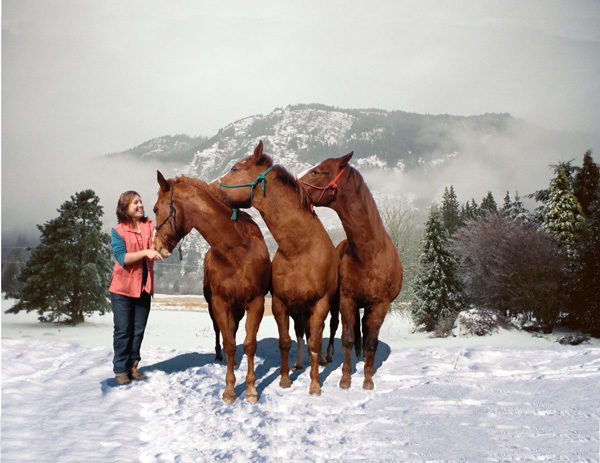 Crossing necks is a sign of friendship – you can imitate it while caressing him.
Hälse-Kreuzen ist ein Freundschaftszeichen. Man kann es beim Streicheln imitieren.
|
Partner or high-performance sports apparatus?
- The most fundamental question whether the horse is endowed with a soul or spirit or whatever you wish to call it, determines everything else. No, my horse does not read philosophy (and most of my human acquaintances here don’t either), but I know that he has very similar and in many cases exactly the same emotions as I do. So it is simply impossible to treat him like a machine that I can park and neglect, when other things seem more pressing. If I didn’t show up, he would be worried or sad. I simply could not knowingly make him sad. You don’t do that to friends.
|
|
Partner oder Sport Hochleistungsgerät?
- Die grundsätzlichste Frage, ob ein Pferd eine Seele hat oder wie immer man das nennen will, bestimmt doch alles andere. Nein, mein Pferd liest keine philosophischen Werke (und die meisten meiner menschlichen Bekannten auch nicht), aber ich weiß, daß es ganz ähnliche und in vielen Fällen genau dieselben Gefühle hat wie ich. Es ist daher total unmöglich, es wie eine Maschine zu behandeln, die ich nach Gutdünken parken und vernachlässigen kann, wenn ich lieber was anderes machen möchte. Wenn ich nicht erschiene, wäre er besorgt oder traurig, und das könnte ich wissentlich niemals tun – so behandelt man Freunde nicht.
|
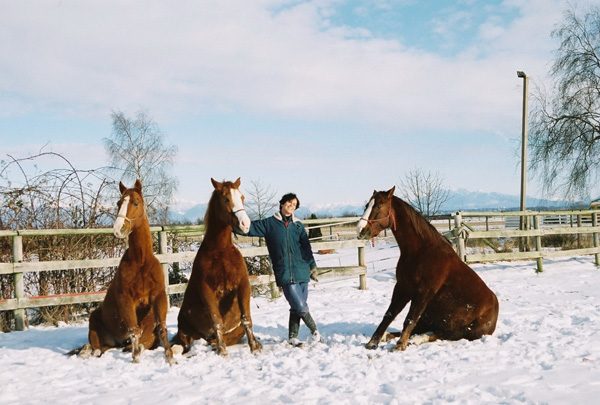 I could simply not let them down – imagining their disappointment is enough to prevent me!
Ich könnte sie einfach nicht “sitzen lassen” – um ihre Enttäuschung zu wissen ist genug, mir das unmöglich zu machen. |
What constitutes friendship between human and horse?
- German has this short word “artgerecht”, which means “according to their natural environment and characteristics of their species”. That’s what horses want – to be treated “artgerecht” – but words can’t cover the fact that this is largely impossible, because we simply can’t offer our horses all that used to be natural to them. But we can try!
Let’s make a list of what a horse wants:
1.Safety:
- For our flight animals safety does of course NOT mean to be looked in behind safe doors and without being able to scan the surroundings! That would totally go against all his natural instincts!
- The safety he needs must be delivered in your behaviour – this is most important – and we discussed what you have to learn to provide the knowledgeable leadership to your horse in the Blog Series “Playing with Knowledge” at great length:
- what it means to become your horse’s leadmare
- how to become a herd-member
- how to become his friend
- how to establish the ranking, and so on.
- In part 07 of that series we looked at a whole list of leadership qualities, which you have to learn to instill the kind of trust in your horse, so that he can truly feel safe with you.
|
|
Wie sieht eine gute Freundschaft zwischen Mensch und Pferd aus?
- Ein Pferd will wie ein Pferd „befreundet“ werden – auf deutsch nennen wir das „artgerecht“. Und obwohl wir ihnen in vielen Aspekten das ihrer Natur entsprechende Leben nicht bieten können, so können wir es doch wenigstens annähernd versuchen!
Machen wir mal eine Liste von dem, was ein Pferd gerne will:
1. Sicherheit:
- Für unsere Fluchttiere bedeutet das natürlich NICHT hinter sicheren Türen eingeschlossen zu sein, ohne die Umgebung abschätzen zu können! Das ginge ihnen ganz und gar gegen alle natürlichen Instinkte!
- Die Sicherheit, die Ihr Pferd möchte, muß mit Ihrem Verhalten geliefert werden – das ist ganz wichtig – und wir haben schon ausführlich in der Blog-Serie „Fachmännisch Spielen“ diskutiert, was man dazu lernen muß:
- Was es bedeutet, seines Pferdes Leitstute zu werden
- Wie man ein gutes Herdenmitglied wird
- Wie man sein Freund wird
- Wie man den Rang in der Herde bestimmt usw.
- Im Teil 07 dieser Serie steht die ganze Liste der Führungsqualitäten, die man erlernen muß, um seinem Pferd das Vertrauen einflößen zu können, damit es sich wirklich mit Ihnen sicher fühlen kann.
|
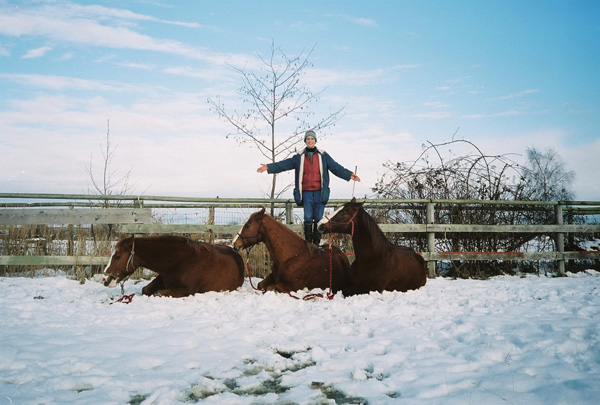 Your horses trust you – you can trust your horses. All is cool!
Ihre Pferde vertrauen Ihnen – Sie können den Pferden vertrauen. Alles gebongt! |
Christmas gift # 2:
You have to invest this time, if you want to be useful to him!
2. Food :
- That seems to be the most obvious and of course we are feeding them (except those folks we discussed in the last Blog!). Horses will accept most any food you offer – he doesn’t have a choice.
- I don’t want to lecture about correct feeding practices here, but we should be aware that horses should have access to hay all day and to pasture as much as possible, rather than receiving a huge portion only twice a day. According to their nature horses should eat continuously for 16 hours a day – grass! They are made for that and that is what they want most (and get most rarely). A horse’s stomach is not made for being fed rarely in large portions (like a lion, who makes a kill, eats his fill and then doesn’t need any more for days). In anticipation of a constant supply of grass, it produces acids all the time (not just when food falls in, like our predator stomachs) and feeding them only twice a day and with large portions can lead to ulcers.
|
|
Weihnachtsgeschenk # 2:
investieren Sie die dazu nötige Zeit, wenn Sie ihm nützen wollen!
2. Futter:
- Das ist offensichtlich und natürlich füttern wir sie (außer den Menschen, die im letzten Blog erschienen!). Pferde nehmen fast jedes Futter an, da wir ihnen bieten – sie haben ja keine Wahl.
- Ich will hier keinen Vortrag über richtiges Füttern halten, aber wir sollten wissen, daß Pferde den ganzen Tag lang Zugang zu Heu haben sollten, und zu einer Weide, wenn irgend möglich, anstatt nur zwei mal am Tag eine große Portion Futter zu erhalten. Ihrer Natur gemäß fressen Pferde konstant 16 Stunden am Tag – Gras! Dafür sind sie geschaffen und das wollen sie am meisten (und bekommen es am seltensten). Ein Pferdemagen ist nicht dazu geschaffen nur selten eine große Portion zu verdauen (wie ein Löwe, der Beute schlägt, sich voll haut und dann tagelang nichts mehr braucht). In Erwartung konstanter kleiner Mengen Gras produziert er immerfort Säuren (nicht wie unser Magen nur, wenn Essen ankommt) – und daher kann falsches Füttern leicht zu Magengeschwüren führen.
|
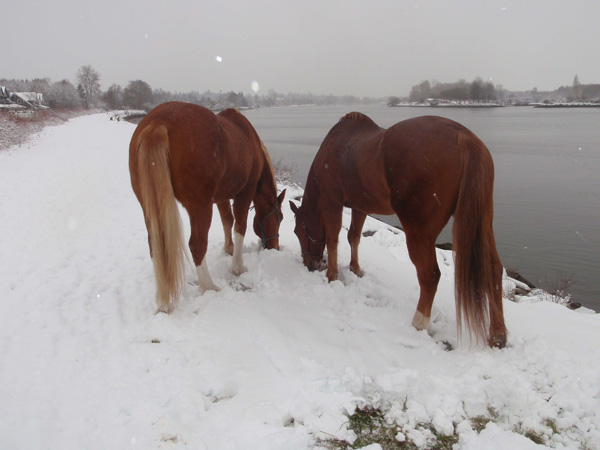 Going grazing is even fun in the snow – Beau and King don’t mind cold noses!
Grasen gehen macht sogar im Schnee Spaß – Beau und King macht die kalte Nase nichts aus!
|
Christmas gift # 3:
- Take them for a walk! Any little bit helps. (Read Blog 5 and 6 of above mentioned series you can find all the additional benefits of walks together!) Considering that grazing together is THE most important social activity for your horse, you are perhaps not his best friend, if you can never make time for it…
3. Shelter and rest:
- We mostly DO provide shelter and there is no need to discuss this at length.
- Rest however: here you should pay attention to the horses’s language telling you, when more rest might be needed and at what time, if you are training him very ambitiously. In the series “H.E.M. Help, Explain and Motivate” I mentioned that horses are slow and tentative perhaps (if confused) and lazy (if bored), but not “obstinate” out of principle.
|
|
Weihnachtsgeschenk # 3:
- Gehen Sie zusammen grasen! Jedes bißchen tut gut. (Lesen Sie Blog 5 und 6 in der oben genannten Serie für all die guten Nebenwirkungen, die ein Spaziergang sonst noch haben kann!) Wenn man bedenkt, daß zusammen Grasen für Ihr Pferd DAS wichtigste soziale Verhalten überhaupt ist, dann sind Sie vielleicht nicht der beste Freund, wenn Sie nie Zeit dafür finden…
3. Unterstand und Ruhe:
- Die meisten Pferde haben ja einen Stall und wir brauchen da nicht viele Worte verlieren.
- Aber Ruhe: hier muß man auf die Sprache des Pferdes achten und verstehen, wenn und wann es eine Schnaufpause braucht, wenn Sie ehrgeizig trainieren. In der Serie „H.E.M.- Helfen, Erklären und Motivieren“ habe ich erwähnt, daß Pferde vielleicht zögerlich sind (meist verwirrt) und faul (wenn gelangweilt), aber nie aus Prinzip „dickköpfig“.
|
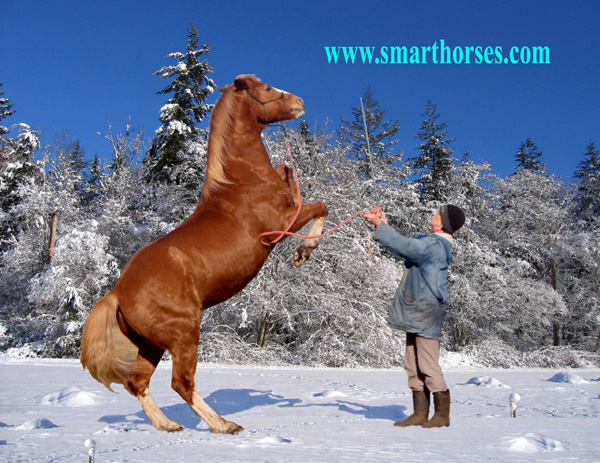 Make him feel that he is the BEST !
Lassen Sie ihn erleben, daß er der BESTE ist!
|
Christmas gift # 4:
- Have the guts to check your own short-comings as a trainer instead of blaming your horse, if something does not work. Don’t torture him with trying over and over, if today is just not a good day for him! Find a different way! Read the HEM Blogs and learn the 10 Laws of Shaping!
Task and purpose:
- Every animal with a soul needs a mental challenge and a feeling of success to be fulfilled, so they can end the day (or training session) with a sense of achievement and a big sigh of content.
Christmas gift # 5:
- The 10 Laws of Shaping (read the HEM Blogs for full details) teach you how to make it easy and fun for your horse to achieve that feeling of being the greatest honcho around – and as we all know, there simply IS no better feeling! With previously abused horses like my Beau this might take a long time – but the sigh ALWAYS COMES! Wait for that sigh!
Christmas gift # 6:
- PLAY with your horse! Variety and interest is the spice of life. Playing with your horse does not mean that you have to give up riding!! You can play for 10 minutes as warm-up or cool-down before or after – and if you lack ideas of what games might interest your horse, buy my book “From Leading to Liberty – 100 training games your horse will love to play”. I play those games with all horses I lay hands on – I know they all love it!
- When I park Beau next to a rock to mount him during one of our outings, he instantly climbs it himself – he never leaves out an opportunity to show me how clever he is. THAT is a happy motivated horse.
|
|
Weihnachtsgeschenk # 4:
- Haben Sie die Courage Ihre eignen Unzulänglichkeiten als Trainer zu prüfen, anstatt Ihr Pferd zu beschuldigen, wenn etwas nicht klappt. Quälen Sie es nicht mit immer weiteren Versuchen, wenn heute einfach kein guter Tag für es ist! Finden Sie einen besseren Weg! Lesen Sie die HEM Blogs und lernen Sie die 10 Gesetze des Formens!
Aufgabe und Vorsatz:
- Jedes beseelte Tier braucht eine mentale Herausforderung und eine Aufmunterung, damit es das Ende des Tages (oder der Trainingseinheit) mit einem Erfolgsgefühl und einem zufriedenen Seufzer beschließen kann.
Weihnachtsgeschenk # 5:
- Die 10 Gesetze des Formens (HEM Blogs nennen Details) lehren Sie, ihrem Pferd dieses Gefühl „ich bin der tollste Hecht!“ zu geben – und wir wissen doch alle, daß es kein besseres Gefühl gibt! Mit früher mißhandelten Pferden wie meinem Beau kann das eine Weile dauern – aber der Seufzer KOMMT IMMER! Warten Sie darauf!
Weihnachtsgeschenk # 6:
- SPIELEN Sie mit Ihrem Pferd! Abwechslung und Interesse sind die Würze des Lebens. Mit Ihrem Pferd spielen heißt ja nicht, daß Sie das Reiten aufgeben sollen! 10 Minuten in der Aufwärm- oder in der Auskühlphase hinterher genügen – und wenn es Ihnen an Ideen für nette Spiele fehlt, dann kaufen Sie das Buch “From Leading to Liberty – 100 training games your horse will love to play”. (ganz leichtes Englisch und viele Zeichnungen!) Ich spiele sie mit allen Pferden, die ich in die Hand bekomme – und ich weiß, sie mögen es alle!
- Wenn ich Beau neben einem Felsbrocken parke, um bei einem unserer Ausflüge aufzusteigen, dann steigt er erst mal schnell selber hinauf – nie läßt er eine Gelegenheit aus, um mir zu zeigen, wie clever er ist. DAS ist ein motiviertes und glückliches Pferd.
|
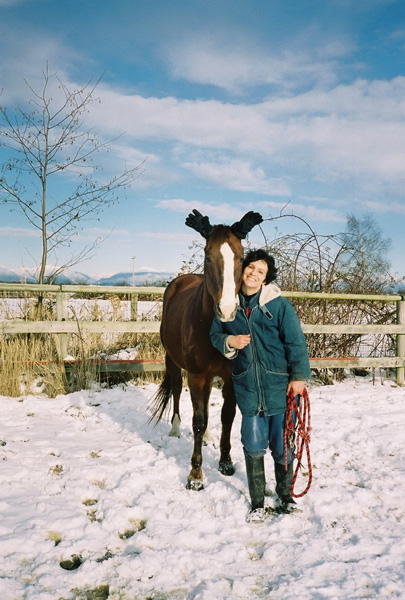 A very Merry Christmas and a fulfilled and Happy New Year to all of you !
Fröhliche Weihnachten und ein erfülltes und glückliches Neues Jahr für Alle!
|
And with all this in mind, I wish to all of you and all your horses from my heart a very Merry Christmas and a Happy New Year !!!
|
|
Und mit all dem im Sinn wünsche ich Ihnen und all Ihren Pferden von ganzem Herzen Fröhliche Weihnachten und ein Glückliches Neues Jahr !!!
|









